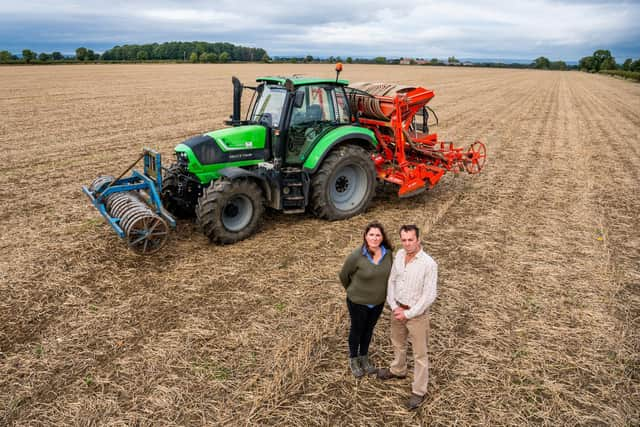Legislation to stop large scale solar developments should go further say Yorkshire farmers fighting to save their farm
Tabled as an amendment to the Energy Bill, the proposed legislation would stop projects more than 500 acres in size from being built when at least 20 per cent is classified as “best and most versatile agricultural land”.
The proposed change was introduced by Alicia Kearns, Conservative MP for Rutland and Melton in the East Midlands, who is campaigning against a large solar farm being built in her constituency.
Advertisement
Hide AdAdvertisement
Hide AdShe argues the plant, at 1,144 acres, is too big for her county and that its supply chain may be linked to the forced labour of Uighur Muslims in Xinjiang, China.


MPs are yet to debate and vote on the amendments and the proposed solar restrictions are just one of dozens of suggestions that may or may not be passed.
However, Robert and Emma Sturdy who farm at Old Malton in North Yorkshire believe the amendment, if introduced, should also look at smaller planned solar developments.
They are third generation tenant farmers at Eden Farm, which is 280 acres or mainly arable land with some cattle, and leased from the Fitzwilliam Trust Corporation Ltd.
Advertisement
Hide AdAdvertisement
Hide AdThree years ago the Sturdys were told the Trust planned to take 130 acres of the farm land they have for a solar development project and the family has been campaigning ever since against it.
While a change to the Energy Bill would protect some landowners, she said it still left tenant farmers on a smaller scale like themselves vulnerable.
Mrs Sturdy said: “We welcome the recognition of the importance of retaining Best and Most Versatile (BMV) farmland, but we believe solar developments of all sizes must be regulated, not just those over 500 acres.
"If only the larger schemes with BMV are protected then this would have a knock on effect and no doubt see an increase in smaller scale solar applications on farmland. This is more likely to impact smaller farms and have a direct hit on tenant farmers like us. We would like to see this amendment apply to all solar applications on BMV land, irrespective of the acreage.
Advertisement
Hide AdAdvertisement
Hide Ad“Instead of enabling the already financially advantaged landowners to make big money from agricultural land, government should focus its efforts on the 250,000 hectares of south facing, industrial roof space in the UK which would generate 50 per cent of the UKs electricity demand.”
Mrs Sturdy also raised the issue of food sustainability and how taking farmland for energy would not help improve the UK’s overall situation.
She added: “Food security is as important as energy security. The UK is only self sufficient for 221 days of the year and it is self evident that the more land we take out of production, the fewer farmers we will have and the less food we are able to produce.
"Of course if Local Authorities were more consistent and simply follow the principles with regard to BMV laid out in Local Plans and the National Planning Policy Framework (NPPF), this would not be a problem."
Advertisement
Hide AdAdvertisement
Hide AdThe UK Government wants to build 70GW of solar capacity by 2035 and the Energy and Climate Intelligence Unit (ECIU) said a large proportion of this will have to come from infrastructure installed on the ground.
They calculated that of England’s 58GW share of the UK’s total target, between 23GW and 38GW will need to be ground-based, depending on how much is added to rooftops, although they estimate that buildings have only enough space to accommodate up to 22GW on top of the 12.7GW of total solar capacity already installed.
The ECIU said almost 173,000 acres will be needed to meet the solar target, which accounts for 0.7 per cent of English farmland, and if the amendment to the Energy Bill is passed it will prevent millions of acres from being suitable for solar farms.
They also argue that UK households could collectively lose up to £5bn a year if large-scale solar farms on productive agricultural land are blocked as it would leave each UK household up to £180 a year worse off because the equivalent electricity would be produced by using more expensive gas instead.
